We identified two exceptional young physicians to support their specialty training.
We hit the jackpot when we met Drs Raju Dhakal and Prakash Paudel. They are two exceptional and dedicated young doctors whom we not only mentor but with whom we have forged enduring bonds of friendship. Both successfully passed their specialty exams (on their first try).
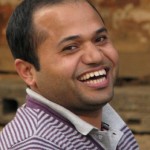 Dr Raju Dhakal
Dr Raju Dhakal
Polio afflicted Raju as a child. To this day, crutches restrict him physically but his spirit and determination are unquenchable. Raised in a remote village three days’ walk to the nearest bus, his parents must have recognized his ‘specialness’ for they had the perspicacity to send him to live at the SOS Children’s Village near Kathmandu. His parents’ sacrifice was his salvation. In Raju’s own words:
In the core of my heart…I wanted to be a doctor…. It was first time the SOS Children’s Village…had received such a request, and no disabled person had ever dared to study medicine. Full of doubt and uncertainty, but with a determined heart, I went to Village’s national office and explained my interest. National Office was positive about my proposal. It was the second time my eyes filled with tears, BUT this time it was tears of joy and celebration! It was the most memorable moment in my life….
When we met Raju in 2009, he had just begun practising at SIRC, and was also working two other jobs – teaching anatomy and covering night call in a local emergency department. That meant that he could only work part time at SIRC during his first months there. He had placed well in his medical school class. At SIRC, he cared for about forty patients with the assistance of two nurse clinicians. We began teaching sessions with him and found his brain was like a sponge, thirsty for knowledge. He attended two Asian Spinal Cord Network (ASCON) conferences (one in combination with the annual meeting of the International Spinal Cord Society (ISCoS), visited the Indian Spinal Injury Centre twice and in early 2011 won an observership position at the National Rehabilitation Hospital in Ireland.
We discussed various options with Raju for credentialing in Physical Medicine and Rehabilitation or other specialty, and carefully explored the options for out-of-country and out-of-region training. North American training was prohibitive in cost and there are other benefits to regional training: the likelihood of return to work in the home country is greater and the management techniques taught are based in an economy similar to that of Nepal. He was accepted by the PM&R program at Bangabandhu Sheikh Mujib Medical University in Dhaka, Bangladesh, and began his residency training in March of 2012, qualifying as a specialist in PM&R in the spring of 2017. For this training, we provided tuition expenses and a monthly stipend for five years, as well as money for airfare for periodic visits home. We have worked closely with the Spinal Injury Rehabilitation Centre in Nepal to ensure his financial support through his five years of training and back into practice in Nepal – he began work as Medical Director in May 2017.
Raju and Sheela were married on October 16th 2012 and were together in Dhaka until she successfully completed her Master’s degree in public health. Sheela returned to work in SIRC in the fall of 2015 following the earthquake, and later worked in a disability program for the Karuna Foundation in Nepal. Following time off over the time of the pandemic, she is looking forward to returning to the disability management field in the near future.
Raju has surpassed our expectations in his clinical and administrative skills. He now works clinically with 2-3 hospitalists on the ward and as part of the management team. He has established a urodynamics lab at the hospital. His management talent skills were developed during the SIRC response to the surge of injured patients who were transferred for care following the 2015 earthquake, working alongside intermittent foreign medical support and with SpiNepal clinicians via Skype. The ongoing COVID pandemic also presented special challenges, requiring stratification of resources as those COVID-infected nursing staff who could work cared for COVID positive patients. A second wave of COVID infection this year was fortunately after most of the care staff had been vaccinated. He has three Pubmed-listed publications to date with physiatrist and co-author Christine Groves. He worked on curriculum development for the SCI eLearn educational modules and has been an active participant in rehabilitation services planning with Nepal’s Ministry of Health, including the development of training manuals. He is very capable as a teacher and leader of workshops, arranging a series of workshops in Nepal with Australian funding, and is a fluent television presenter (see image right). 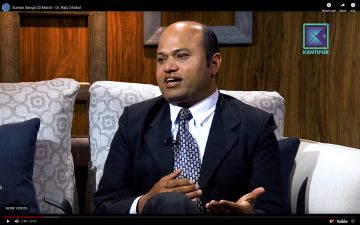
Raju joined forces with a UK team to develop telerehabilitation for SIRC’s remote patients and has already begun discussions with the SIRC administration and board to plan a rehabilitation resident training program, and has most recently worked with SpiNepal on a seed funding grant proposal. We talk with Raju and Sheela every few weeks. Raju and Christine are lead team members in the recently funded project “A Physical Medicine and Rehabilitation Residency by, in and for Nepal“.
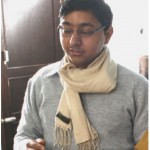 Dr Prakash Paudel
Dr Prakash Paudel
Prakash’s story is no less inspiring. As he tells it:
Having been born…in one of the most remote parts of the nation, even a notion of acquiring a good education was a farfetched dream…. My father can barely read and write, whereas my mother was illiterate…. It was in…my ninth grade, when the concept of medical school was introduced to me…. I lost my mother…as a result of a crossfire between armed rebels and security forces right outside my doorstep…. I got to know about it a day later, amidst friends discussing the prospect of medical school.
Prakash worked in the community prior to developing his interest in spine work. He was working at the Kathmandu Model Hospital as a neurosurgical medical officer when we first met him, where he undertook a research project focussing on the role of folic acid in prevention of spina bifida. His paper “Awareness of periconceptional folic acid supplementation among Nepalese women of childbearing age: a cross-sectional study” was published in the journal Preventive Medicine. He placed well in the qualifying exams of the Pakistani College of Surgeons (commonly used in Nepal) but was unable to afford the training and exams beyond that would qualify him to proceed with neurosurgical training. With our encouragement and backing he began this residency with the support of the local neurosurgical head. He completed eighteen months of general surgical residency at the end of June 2012 prior to entering the three years of neurosurgical training. He received credentialing as a neurosurgeon and is now a fellow of the College of Surgeons of Pakistan, a qualification accepted in Nepal. (He was awarded the gold medal for the highest marks in the examination.)
Prakash worked in Bir Hospital in Kathmandu for about one year after passing his specialty exams. He was awarded a three-month fellowship in neuroendoscopy in Greifswald in Germany (fall 2017) and has since been working in a neurosurgical department at Mediciti Hospital in Kathmandu, developing skills as a spine surgeon with as-needed online consultation with Canadian colleagues. He attended and presented a paper at the AO Global Spine Conference in Toronto in May 2019 (photo right taken with colleagues in Vancouver en route to Toronto) and has had several papers published in Nepal and internationally. 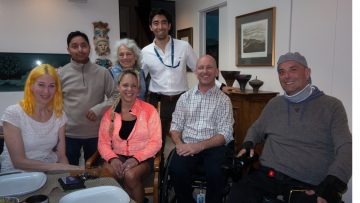 The subspecialty of Spine Surgery, which is open to neurosurgeons and orthopedic surgeons with (usually) a one-year fellowship, is evolving in Nepal and in due course it is likely that a major trauma centre will develop a focussed spine program. Prakash was accepted for a one-year combined adult and pediatric spine surgery fellowship in London, Ontario which he completed at the end of February 2023. You can read his blog here: https://spinepal.orthopaedics.med.ubc.ca/spine-fellow/
The subspecialty of Spine Surgery, which is open to neurosurgeons and orthopedic surgeons with (usually) a one-year fellowship, is evolving in Nepal and in due course it is likely that a major trauma centre will develop a focussed spine program. Prakash was accepted for a one-year combined adult and pediatric spine surgery fellowship in London, Ontario which he completed at the end of February 2023. You can read his blog here: https://spinepal.orthopaedics.med.ubc.ca/spine-fellow/
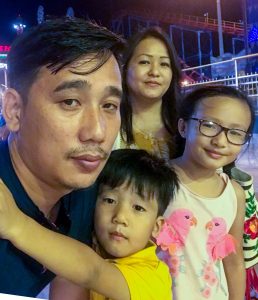 Supporting another physiatrist for SIRC: Dr Jas Gurung
Supporting another physiatrist for SIRC: Dr Jas Gurung
Nepal still needs more rehabilitation physicians to provide rehabilitative care of spinal injured and patients with other disabilities. Indeed, Nepal needs its own training program in rehabilitation medicine and will in turn need more specialists to act as faculty to train rehabilitation medicine specialists. Realizing the need of specialized rehabilitation services in Nepal and considering our request of support, SpiNepal agreed two years ago to sponsor the completion of rehab specialty training of another Nepalese physician, Dr. Jas Bahadur Gurung, during his residency training program in Dhaka, Bangladesh. Dr. Jas Gurung is a physician from Pokhara who worked for six years at the Green Pastures hospital in that city. He became aware at that time of the potential benefits of and the need for high quality medical rehabilitation. In 2015 he began his rehab residency in the BSMMU program in Dhaka, the same program that Raju completed. Nepal’s major earthquake happened soon after he began and he was able to join the medical team led by current BSMMU Rehab department head Dr Taslim Uddin and Raju (who was still a resident then) that returned to provide medical care as the newly injured patients began to arrive. At that time he and Raju established a good working relationship. His training interrupted by the 2020 COVID-19, Jas worked for a while in 2020 at SIRC gaining experience with SCI and assisting with the viral outbreak at SIRC. At the beginning of 2021 SpiNepal and Canadian friends arranged Zoom seminars to address some of the SCI topics that Jas might encounter in the exams.
As Dr Raju stated “Dr. Jas will smoothly complete his residency training program in Bangladesh and return to serve in Spinal Injury Rehabilitation Centre (SIRC), Nepal. He will work with us at SIRC to enhance the quality of SCI care and will join the team planning residency training program of physical medicine and rehabilitation in Nepal. At this time we wish to again thank Canada’s SpiNepal and Nepal’s Spinal Injury Sangh, and to congratulate Dr. Jas Bahadur Gurung for aligning his goals with ours.” Dr Jas passed his exams in Dhaka and in Nepal and joined the medical staff of SIRC in February 2022.